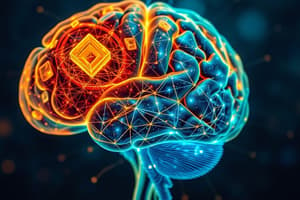Podcast
Questions and Answers
¿Cuál es la teoría de la inteligencia que propone la existencia de nueve tipos de inteligencia?
¿Cuál es la teoría de la inteligencia que propone la existencia de nueve tipos de inteligencia?
¿Cuál es el componente de la inteligencia que se refiere a la capacidad de procesar y razonar información?
¿Cuál es el componente de la inteligencia que se refiere a la capacidad de procesar y razonar información?
¿Cuál es el factor que se considera responsable de un 40-50% de la variación en la inteligencia?
¿Cuál es el factor que se considera responsable de un 40-50% de la variación en la inteligencia?
¿Cuál es el nombre de la escala que se utiliza para medir la inteligencia?
¿Cuál es el nombre de la escala que se utiliza para medir la inteligencia?
Signup and view all the answers
¿Cuál es el área de aplicación de la investigación de la inteligencia que se centra en el desarrollo de intervenciones para mejorar las habilidades cognitivas y la función neural?
¿Cuál es el área de aplicación de la investigación de la inteligencia que se centra en el desarrollo de intervenciones para mejorar las habilidades cognitivas y la función neural?
Signup and view all the answers
¿Cuál es el tipo de inteligencia que se refiere a la capacidad de entender y utilizar información verbal?
¿Cuál es el tipo de inteligencia que se refiere a la capacidad de entender y utilizar información verbal?
Signup and view all the answers
Study Notes
Intelligence
Definition and Theories
- Intelligence: the ability to learn, understand, and apply knowledge to adapt to the environment
- Multiple theories of intelligence:
- Gardner's Multiple Intelligences Theory: 9 types of intelligence (linguistic, logical-mathematical, spatial, bodily-kinesthetic, musical, interpersonal, intrapersonal, naturalistic, and existential)
- Sternberg's Triarchic Theory: 3 components of intelligence (analytical, creative, and practical)
- Fluid and Crystallized Intelligence: fluid intelligence (processing and reasoning) and crystallized intelligence (stored knowledge and experience)
Types of Intelligence
- Verbal-Comprehension Intelligence: ability to understand and use verbal information
- Perceptual-Organization Intelligence: ability to perceive and organize visual information
- Working Memory Intelligence: ability to hold and manipulate information in working memory
- Processing Speed Intelligence: ability to quickly and accurately process information
Factors Influencing Intelligence
- Genetics: heritability of intelligence, with estimates suggesting 40-50% of variation due to genetic factors
- Environment: role of education, nutrition, and socio-economic status in shaping intelligence
- Interaction between Genetics and Environment: epigenetic factors influencing the expression of genes related to intelligence
Measuring Intelligence
- Intelligence Quotient (IQ): score calculated from standardized tests, such as Stanford-Binet and Wechsler Adult Intelligence Scale (WAIS)
- Criticisms of IQ Tests: concerns about cultural bias, narrow scope, and limited predictive validity
Applications of Intelligence Research
- Education: tailoring instruction to individual learning styles and abilities
- Occupational Selection: using intelligence tests to identify suitable candidates for certain jobs
- Neuroscience and Cognitive Training: developing interventions to improve cognitive abilities and neural function
Studying That Suits You
Use AI to generate personalized quizzes and flashcards to suit your learning preferences.
Description
Explora la teoría de la inteligencia, incluyendo definiciones, tipos y teorías de inteligencia, factores que influyen en la inteligencia y sus aplicaciones en la educación y el trabajo. ¿Cuánto sabes sobre la inteligencia?




